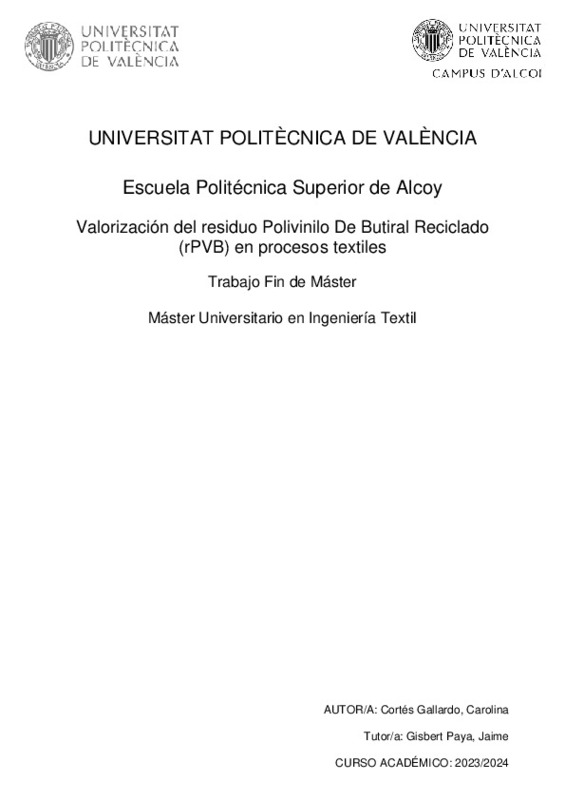|
Resumen:
|
[ES] Desde el año 2015 existe una normativa europea que obliga a que el 95% de un vehículo sea
reciclado, con el fin de evitar la problemática de acumulación y descontrol de residuos existente
a nivel mundial. Para ello, ...[+]
[ES] Desde el año 2015 existe una normativa europea que obliga a que el 95% de un vehículo sea
reciclado, con el fin de evitar la problemática de acumulación y descontrol de residuos existente
a nivel mundial. Para ello, los Centros Autorizados de Tratamiento de Vehículos (CAT) realizan
diferentes tareas de descontaminación, reutilización y reciclado de las diferentes partes del
automóvil. Entre estas, destaca la retirada de los vidrios de seguridad utilizados en las ventanas
y lunas de automóviles que, generalmente, son hojas de vidrios unidas mediante una lámina de
Polivinilo de Butiral (PVB). Hasta la fecha, pese a que el PVB reciclado (rPVB) se ha utilizado en
la fabricación de nuevos productos, su uso en la industria, y en concreto en la industria textil, se
encuentra limitado.
Este proyecto pretende investigar la aplicación de rPVB en diferentes procesos textiles
buscando, además de la valorización de este tipo de residuo, ofrecer una alternativa a las resinas
convencionales (generalmente provenientes del petróleo) que se utilizan comúnmente en dicha
industria. De esta forma, se considera que los resultados obtenidos del proyecto pueden tener
efectos positivos en el fomento de la economía circular en la industria textil, donde existe una
demanda cada vez mayor de productos y procesos más sostenibles y ecológicos, que permitan
reducir la contaminación que se le asocia.
[-]
[EN] Since 2015, there has been a European regulation that requires 95% of a vehicle to be recycled,
in order to prevent the problem of accumulation and uncontrolled waste existing worldwide. To
achieve this, Authorized ...[+]
[EN] Since 2015, there has been a European regulation that requires 95% of a vehicle to be recycled,
in order to prevent the problem of accumulation and uncontrolled waste existing worldwide. To
achieve this, Authorized Vehicle Treatment Centers (CATs) carry out different tasks of
decontamination, reuse, and recycling of the different parts of the car. These include the
removal of safety glass used in car windows and glass panes, which are generally sheets of glass
bonded together with a Polyvinyl Butyral (PVB) film. To date, although recycled PVB (rPVB) has
been used in the manufacture of new products, its use in the industry, and specifically in the
textile industry, is limited.
This project aims to investigate the application of rPVB in different textile processes, seeking, in
addition to the valorization of this type of waste, to offer an alternative to conventional resins
(usually from petroleum) that are commonly used in this industry. In this way, it is considered
that the results obtained from the project can have positive effects on the promotion of the
circular economy in the textile industry, where there is an increasing demand for more
sustainable and ecological products and processes, which allow reducing the pollution
associated with it.
[-]
|







